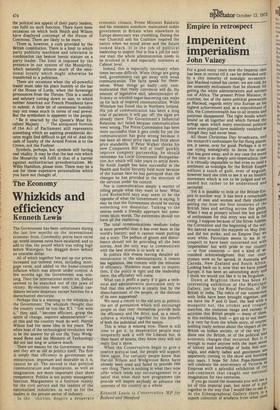The Economy
Whizkids and efficiency
Kenneth Lewis
The Government has been unfortunate during the last few months on the international economic front. Commodity prices have raced up; world interest rates have escalated; and to add to this, the pound which was riding high before Watergate, has dragged down behind an unstable dollar.
All of which together has put up our prices, increased our interest rates, including mortgage rates, and added to the home-created inflation which was almost under control. A few months ago the Government was winning. Then the international storm hit. Defeat seemed to be snatched out of the jaws of victory. By-elections were lost; Liberal candidates became desperate escape, hatches for a disenchanted electorate.
Perhaps this is a warning to the whizkids in the Government. The whizkids thought that the country could be run like ICI. "Get with it," they said, "become efficient, grasp the nettle of change, improve administration" — all this and the country must do well. Harold Wilson had the same idea in his years. The white heat of the technological revolution was to be the answer for all our ills; Tony Wedgwood Benn and his Ministry of Technology did not last long or achieve much.
There are lessons for the Government in this and they are as old as politics itself. The first is simply that efficiency in government administration, important and desirable as it is, cannot be all. The second is that political communication and inspiration, as well as imagination, are more important than sheer competence. Politics is not purely managerial function. Mangaement is a function mainly for the civil service and the leaders of the nationalised industries: as well as for the leaders in the private sector of industry.
In the 'thirties, despite a desperate economic climate, Prime Minister 1:Ildwin and his ministers somehow maintained stable government in Britain when elsewhere in Europe democracy was crumbling. During the war Churchill and his Coalition inspired the nation when we stood alone and the future looked black. It is the job of political leadership to inspire. Nor is this a job for only one man; the whole administration needs to be involved in it and especially ministers at Cabinet level. .
Indeed, this is especially necessary when times become difficult. When things are going well, governments can get away with weak communication. The facts speak for themselves. When things go badly only communication that really convinces will do. No amount of legislative skill, administrative efficiency or whizkid eager-beavering can make up for lack of inspired communication. Willie Whitelaw has found this in Northern Ireland. His job of communication has been a long trial of patience; it will pay off; the signs are already there. The Government's Industrial Relations Act failed because communication went wrong. The Prices Commission has been more successful than it gets credit for yet the communication has gone wrong because it has been all about price rises and little about price standstills. If Peter Walker thinks his new Companies Bill will of itself quickly improve company partnership, he should remember his Local Government Reorganisation Act which will take years to settle down. Sir Keith Joseph has been successful in the Health and Social Security field more because of the human face he has portrayed than the changes he has provided in the structure of the services under his control.
Nor is communication simply a matter of telling people what they want to hear. What Lord Rothschild says may seem to be the opposite of what the Government is saying. It may be that the Government should be saying something not dissimilar. Talking to the unions needs a friendly approach but sometimes blunt words. The extremists should not have all the expletives.
The total communications medium today is more powerful than it has ever been in the world's history; and it cannot resist putting out a story. The pedlars of gloom and disturbance should not be providing all the best stories. And the only way to communicate with the best stories is to work at it.
In politics this means leaving detailed administration to the administrators; it means less legislation, less concern with the minutiae of efficiency. Ministers must seek to inspire; then, if the policy is right and the leadership there, the efficiency will come.
What can it profit a party if it gain a technical and administrative motivation only to find that this advance is totally lost by the diSenchantment of the people, or the distrust of its own supporters?
We need a return to the old arts in politics; the art of persuasion which will encourage people so that they themselves provide both the efficiency and the drive, and, as a result, achieve a working together for the benefit of both the individual and the nation.
This is what is missing now. There is still time to get it. In desperation people may temporarily seek it with the Liberals but, in their heart of hearts, they know they will not really find it there.
When the Conservatives begin to give a positive political lead, the people will support them again. For certainly people know that Harold Wilson and Wedgwood Benn have already been tried and failed to provide this very thing. There is nothing in what they now offer which lends any encouragement to a belief that what their new programme can provide will inspire anybody or advance the interests of the country as a whole.
Kenneth Lewis is Conservative MP for Rutland and Stamford


































 Previous page
Previous page